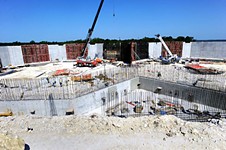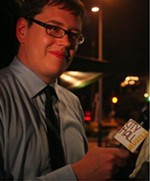House Park Skateboarders Roll for Action
A downtown skate fest raises the call for a city skateboard park
By Wells Dunbar, Fri., July 16, 2004

A flurry of motion, movement, and community involvement signified the start of Austin's Summer Skate Fest Saturday afternoon at the city's "House Park Skate Park" at the Austin Rec Center. Dozens of kids converged on the city's sole public skate park – a small, fenced-in course squeezed beside the center's tennis courts – to bomb the ramps, compete for prizes and bragging rights, and drum up support for a permanent public skate park.
Laurie Pevey, founder of Austin's Tekgnar Skate Shop and the festival organizer, said the event was held "to provide a fun and free afternoon for skateboarders [while] promoting the long overdue agenda of building our public, cement skate park." A public space, to be overseen by the Parks and Recreation Department, was proposed in 2000, according to Seth Johnson, skater and president of the Austin Public Skatepark Action Committee (apsac.mine.nu). But the project has stalled somewhere at City Hall, and the skaters say they're getting increasingly frustrated. The city did set aside initial funds for the park's construction, yet since then, says Johnson, there has "not been a single piece of progress." Groups like Johnson's have held fundraisers to supplement the city's dollars, but the city apparently hoped for actual matching funds from the young skaters, a notion that Johnson considers unrealistic and unfair.
"There is no other sport – basketball, football – where the players are expected to pay" for their own facilities, said Johnson Saturday. "And you see these perfectly manicured baseball fields that are empty half the time. You're trying to deal with childhood obesity – a hot button issue – and the city is behind the times," he said, gesturing toward the throng of skateboarders around him. "Not one of these kids fits the criterion for obesity." And unlike organized sports such as football, which generally require a field and several teammates, Johnson points out, most skaters ply their skills daily, and alone if necessary. So why the lack of support? He shrugged. "You look around here, and how many voters do you see? None." Indeed, few fest participants looked 18 or above.
Reagan Beres of the San Antonio Skatepark Association says they had a similar struggle for public support after forming the association. Several public meetings led to San Antonio finally adopting the association's proposal for an initial park project, and the success of that skate park has led to discussions of a larger, million-dollar facility. Beres is a high school teacher who works less than a mile from the current San Antonio skate park, and she says she has "seen first-hand what a great thing it is for kids" – mostly, she says, middle schoolers with few other opportunities for organized athletics.
Although the overall city budget is in the red, Austin officials were on hand to assure skaters that the park project remains viable. PARD director Warren Struss spoke of the "need to ensure funding is available and sufficient for the design and construction of a permanent skate park." City Manager Toby Futrell reiterated that some $250,000 has been allocated for the park's development – with Mayor Will Wynn's "full support," dating from his initial mayoral campaign.
The current issue is determining a location for the prospective park. Said Futrell, "Part of the problem is finding a site" – a site close to public transportation and ample parking, and with neighbors friendly to increased traffic. So far, the name most in circulation is Mabel Davis Park in South Austin. However, Davis was built over a former landfill, and environmental concerns might slow construction there, something Pevey is keen to avoid. The lack of "clean-up money for Mabel Davis [makes it] more of a longer-term prospect," Pevey said. "We're hoping for more immediate action."
Until then, local skaters may be content to cultivate their own park. Taking a cue from the illicit actions of some BMX riders who created their own trail in the West Bouldin Creek Greenbelt (before getting arrested earlier this year), a band of skateboarders say they are currently and secretly building their own skate park on public property, at an undisclosed location. Johnson says that stacking "several tons of concrete by hand" is evidence of the dedication these athletes have to their craft and their desire for a park to call their own – even if it results in prosecution. "This is something that's not a white, middle-class sport," said an animated Johnson. "Look around – there's white kids, black kids, girls! We need public pressure to force the city to take action."
Got something to say on the subject? Send a letter to the editor.









